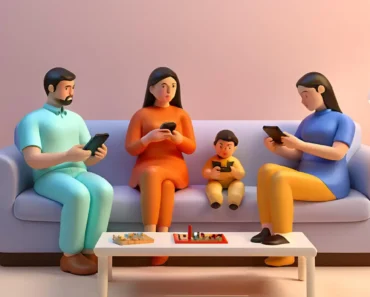Why Your Partner’s Phone Habits Hurt Your Bond (And How to Fix It). This guide explores the common reasons digital devices strain relationships and offers practical strategies to foster deeper intimacy and resolve conflicts.
The Digital Divide: Understanding Why Your Partner’s Phone Habits Hurt Your Bond
Smartphones have become ubiquitous extensions of ourselves, offering endless information, entertainment, and connection to the outside world. While beneficial, this hyperconnectivity often creates a subtle, yet profound, tension within romantic relationships. Many couples find themselves asking: why does my Partner’s Phone Habits Hurt Your Bond? The answer lies in how digital device use impacts attention, presence, and perceived priorities within a partnership.
The problem extends beyond simple distraction. When one partner is constantly glued to a screen, the other often feels ignored, undervalued, or less important than the device. This feeling of being sidelined by technology, a phenomenon sometimes called “phubbing” (phone snubbing), chips away at emotional intimacy. It erodes trust and generates resentment. Minor issues can escalate into full-blown arguments simply because one or both partners feel unheard or unseen due to device interference. This highlights why Partner’s Phone Habits Hurt Your Bond.
Recognizing this common challenge is the first step toward reclaiming genuine connection. It is not about demonizing technology. It is about understanding its subtle influence on intimacy and proactively setting boundaries. The goal is to ensure technology enhances, rather than detracts from, the most important relationships in our lives. Understanding why Partner’s Phone Habits Hurt Your Bond allows for practical solutions.
Key Ways Your Partner’s Phone Habits Hurt Your Bond
Several underlying issues contribute to the conflicts arising from phone use in relationships. Identifying these roots helps couples address the core problems rather than just the symptoms of why Partner’s Phone Habits Hurt Your Bond.
Constant Distraction and Reduced Presence
Phubbing, or phone snubbing, occurs when one person ignores their conversation partner in favor of their phone. This behavior sends a clear, though often unintentional, message: “What’s on my screen is more important than you.” The recipient feels dismissed, disrespected, and undervalued. This constant partial attention undermines active listening and full presence, which are vital for intimacy. This erosion of attention is a primary reason why Partner’s Phone Habits Hurt Your Bond.
When a partner is constantly checking their phone, it creates a subtle, but persistent, emotional distance. It signals that something or someone else holds higher priority. This makes true connection difficult.
Erosion of Quality Time
Screen time often replaces opportunities for meaningful, shared real-world experiences. Instead of engaging in conversation over dinner, couples might scroll through separate feeds. Instead of a walk together, individuals might retreat into their digital worlds. These missed moments, seemingly small, accumulate. They lead to a feeling of emotional disconnect.
Intimacy thrives on mutual discovery, shared activities, and simply being present together without distraction. When screens fill these voids, relationships miss out on vital bonding opportunities. The mere quantity of time spent together might remain constant, but its quality significantly diminishes. This reduced quality of interaction contributes to why Partner’s Phone Habits Hurt Your Bond.
Miscommunication and Emotional Distance
Digital communication, while convenient, lacks the rich nuances of face-to-face interaction. Tone of voice, facial expressions, and body language are missing, leading to misunderstandings. Couples might rely too heavily on texting for important conversations. This causes misinterpretations and unaddressed emotional needs. The dependence on screens can also manifest as anxiety when separated from devices.
This digital dependence creates a barrier to deep, empathetic communication. It inhibits true emotional connection. Understanding these communication shifts explains why Partner’s Phone Habits Hurt Your Bond.
The Deeper Impact: How Partner’s Phone Habits Hurt Your Bond Long-Term
Beyond arguments, unchecked phone use subtly erodes the very intimacy that sustains a strong relationship. Recognizing these deeper impacts helps motivate change and understand the full scope of why Partner’s Phone Habits Hurt Your Bond.
Fostering Resentment
Small annoyances related to phone use, if left unaddressed, can build into significant resentment. A quick text message during a conversation, a phone call interrupting a date, or constant scrolling during family time accumulates. These seemingly minor issues can escalate into major arguments when frustration reaches a boiling point. The underlying reason why Partner’s Phone Habits Hurt Your Bond often stems from this accumulated resentment.
Weakening Trust
Trust forms the bedrock of any strong relationship. When one partner consistently prioritizes their phone over their shared time or explicit conversations, the other partner’s trust can weaken. They might question their partner’s commitment, honesty, or value placed on the relationship. This perceived neglect, driven by phone habits, erodes the sense of reliability and security. This is a profound way Partner’s Phone Habits Hurt Your Bond.
Diminished Intimacy
Physical and emotional intimacy both suffer from phone interference. When attention divides, deep emotional connection becomes difficult. Without strong emotional bonds, physical intimacy can also lessen. The constant presence of a screen creates a barrier to vulnerability and closeness. The relationship becomes more functional and less emotionally rich. This overall diminishment of intimacy is a significant consequence of why Partner’s Phone Habits Hurt Your Bond.
Proven Strategies to Fix Partner’s Phone Habits Hurting Your Bond
Reclaiming your connection and building stronger bonds requires intentional effort and clear boundaries. These strategies help couples navigate device use peacefully and resolve why Partner’s Phone Habits Hurt Your Bond.
1. Establish Tech-Free Zones
Designate specific areas in your home where phones are not allowed. The bedroom and dining table are prime candidates. This creates sacred spaces for connection, conversation, and sleep. Consistent adherence to these zones signals that these places prioritize human interaction. This is a powerful strategy to stop the cycle of why Partner’s Phone Habits Hurt Your Bond.
2. Implement Tech-Free Times
Set aside specific periods each day or week for dedicated tech-free time together. This could be during meals, an hour before bed, or a dedicated evening for conversation or activities. Put phones in a designated basket or drawer. Turn off notifications. Fully engage with each other. This protects quality time from digital encroachment.
3. Practice Mindful Device Use
Become acutely aware of your own digital habits. Before picking up your phone, pause and ask yourself why. Is it out of habit, boredom, or a genuine, urgent need? Set intentions for screen use. This helps you be more deliberate and purposeful. Mindful use means engaging with purpose, not just passively scrolling. This personal discipline is fundamental for managing screen time effectively.
4. Prioritize Active Listening
When engaging in any conversation, whether with a partner, family member, or friend, give your full, undivided attention. Put your phone away, out of sight. Maintain eye contact. Listen to truly understand what the other person communicates, rather than merely waiting for your turn to reply. Ask clarifying questions to show engagement. This signals that you value the other person and their words. Active listening fosters deeper connection and empathy, directly addressing a core reason why Partner’s Phone Habits Hurt Your Bond.
5. Plan Offline Activities Together
Actively plan and initiate activities that encourage face-to-face interaction and shared real-world experiences. This could involve cooking a meal together, going for a walk in nature, playing a board game, or exploring a new hobby side-by-side. These moments create invaluable bonding opportunities and build common memories. They strengthen the relationship beyond digital interactions, providing a crucial counterbalance to screen time.
6. Communicate Expectations Openly
Have open and honest conversations about phone use and its impact on your relationships. Express how device use makes you feel using “I” statements, for example, “I feel disconnected when we are both on our phones during dinner.” Avoid assigning blame. Work together to agree on mutual boundaries and strategies that both partners can commit to. Clear communication builds understanding and shared solutions. This direct conversation helps resolve why Partner’s Phone Habits Hurt Your Bond.
7. Lead by Example
Be the change you want to see. Model the balanced behavior you desire from others. Demonstrate healthy screen habits in your own daily life. Show that you prioritize real-world connections by putting your phone away during conversations and shared activities. Your actions speak louder than words in setting a positive example for managing digital device use within the relationship. When one partner consistently prioritizes connection, the other often follows suit.
Read Also: AI Therapists: Can Bots Fix Relationship Problems?
Investing in Connection: Budgeting for Relationship Health
Investing in your relationship means prioritizing time and intention over just financial outlay. Many valuable strategies for building stronger bonds are low-cost or even free, proving that positive relationship development does not require a large budget.
Prioritizing Experiences Over Digital Upgrades
Instead of constantly upgrading to the latest device or subscribing to numerous streaming services, consider allocating funds towards shared experiences. This could be a weekend getaway, tickets to an event, a cooking class, or a special meal out. These investments create lasting memories and strengthen bonds. They often provide a richer return in terms of relationship satisfaction than material possessions or digital subscriptions. This helps counter why Partner’s Phone Habits Hurt Your Bond.
Low-Cost or Free Connection Activities
Many activities that foster intimacy require minimal or no financial outlay. A walk in the park, a picnic at home, playing board games, having deep conversations, or simply sitting together and listening to music. These simple acts of presence and shared time are invaluable. They build connection and create lasting memories. They are powerful solutions when asking how to stop why Partner’s Phone Habits Hurt Your Bond.
Mindful Tech Spending
If you do choose to invest in technology, do so wisely and with intention. Consider how a new device or service might genuinely enhance connection (for example, improved video calls with distant family) rather than simply creating more distraction or emotional distance. Evaluate whether the technology truly adds value to your relationships or if it merely provides another escape. Budgeting for technology should reflect its intended purpose: a tool to support life, not to dominate it.
Nurturing Relationships: Caring for Connection in the Scroll Age
Nurturing intimacy requires ongoing effort and consistent attention. Like a thriving garden, relationships truly flourish with regular care, diligently protecting them from the metaphorical weeds of distraction and neglect. This continuous care actively helps prevent the very issues that lead to why Partner’s Phone Habits Hurt Your Bond.
Consistent Quality Time and Regular Check-ins
Make quality time a non-negotiable part of your routine. This means scheduling specific time for your loved ones, explicitly free from digital interruption. Consistent check-ins, whether informal daily chats, weekly “state of the union” talks, or dedicated monthly dates, build anticipation and powerfully reinforce the value you place on your relationship. This consistent effort communicates commitment and fosters deep bonds.
Active Empathy and Sincere Validation
Practice active empathy: truly listen to understand the other person’s perspective and feelings without judgment. Validate their emotions, even if you do not necessarily agree with their viewpoint or actions. This crucial practice creates a safe and open space for honest communication and vulnerability. Empathy fosters deeper emotional connection. It powerfully shows you care about their inner world.
Mindful Conflict Resolution
Disagreements are a natural and inevitable part of any intimate relationship. Approach conflicts with a clear focus on understanding the underlying issues and achieving constructive resolution, rather than assigning blame. Crucially, avoid bringing digital devices into arguments. Listen to each other fully and calmly. Communicate your needs and boundaries clearly and respectfully. Effective conflict resolution actively builds resilience in relationships. It teaches you how to navigate challenges together, often deepening intimacy rather than weakening it.
Innovations: When Technology Enhances Intimacy (Not Hinders)
While many discussions focus on the negative impacts, technology can paradoxically enhance intimacy when used intentionally and thoughtfully. Recent innovations offer promising tools to strengthen connections, particularly over distance, proving that not all tech creates distance in relationships.
Enhanced Video Communication and Virtual Shared Experiences
Video call technology has become remarkably sophisticated, offering higher quality visuals and more stable connections. Innovations like shared screen viewing, virtual backgrounds that transport you to different places, or collaborative digital whiteboards create more immersive virtual experiences. Some platforms even allow for shared movie watching or playing games together online, effectively bringing distant loved ones together in shared virtual common spaces. These tools bridge geographical gaps and make long-distance relationships feel much more vibrant and connected.
Relationship-Focused Apps and Thoughtful Prompts
A new wave of smartphone applications specifically focuses on nurturing and improving intimate relationships. These innovative apps might offer daily conversation starters to spark dialogue, shared journaling features for mutual reflection, or gentle reminders for anniversaries and special occasions. Some even provide guided activities or mini-challenges specifically designed for couples. These tools effectively act as digital assistants for connection, actively helping busy couples prioritize their relationship and maintain intimacy amidst demanding schedules. They serve as useful nudges to engage meaningfully, ensuring small yet crucial moments of connection are not overlooked.
Wearable Technology and Shared Health Journeys
Some modern couples are creatively utilizing wearable technology to foster shared wellness goals, adding a unique dimension to their intimacy. Partners might choose to share fitness data, mutually encourage each other in health challenges, or engage in friendly competitions. This fosters a powerful sense of shared purpose and mutual support. This type of technological integration promotes holistic well-being together. It creates a subtle, yet profound, bond through shared health journeys, reinforcing a sense of teamwork and commitment to each other’s welfare.
Making Your Final Decision on Tech and Connection
Balancing technology and intimacy requires ongoing awareness and conscious choices. Focus on nurturing your relationships by consistently prioritizing genuine connection over digital distraction. This ultimate decision directly impacts your overall well-being and the strength of your marital bonds.
Prioritize real-world presence in your interactions. Make designated tech-free zones and specific tech-free times non-negotiable within your home and schedule. Your full, undivided attention is the most valuable gift you can give your loved ones. This consistent presence actively builds trust and deepens bonds.
Consider how technology genuinely serves your relationships. Does it bring you closer to distant loved ones, or does it inadvertently create distance from those physically nearby? Consciously choose to use technology as a tool for connection and enhancement, not as an escape from real-world engagement.
Do not overlook the profound power of small, consistent efforts. Daily acts of presence, active listening, and shared moments accumulate into a strong, resilient relationship. These seemingly minor choices make a significant, lasting impact. This intentional approach helps resolve why Partner’s Phone Habits Hurt Your Bond.
Remember, the goal is not to demonize technology or eliminate it entirely, but to master its use. When you consciously and thoughtfully manage your digital devices, you create a life rich with genuine connection, profound intimacy, and truly fulfilling relationships.
Cultivating Connection in a Digital Age
The tension that often arises from phone use and digital distraction is a defining challenge of our modern era. However, with intentional strategies and a conscious, proactive approach, couples can successfully navigate this delicate balance to foster deeper, more meaningful relationships. This directly addresses the nuances of why Partner’s Phone Habits Hurt Your Bond.
Take time to reflect critically on your own digital habits. Consider how they subtly, or overtly, impact your closest connections. Remember that quality interaction and genuine presence are paramount for thriving relationships. Your dedicated efforts to prioritize presence will yield invaluable returns in terms of relationship satisfaction and emotional well-being.
As you embark on this journey of digital well-being and conscious connection, remain patient with yourself and your loved ones. Adapting ingrained habits takes time and consistent effort. Every deliberate step toward more mindful technology use actively strengthens your interpersonal bonds.
By thoughtfully applying these insights, you can transform your relationship with technology. You ensure it supports, rather than detracts from, the intimacy that profoundly enriches your life. Embrace the enduring power of genuine human connection, moving beyond the question of why Partner’s Phone Habits Hurt Your Bond to build something stronger.
Frequently Asked Questions About Why Partner’s Phone Habits Hurt Your Bond
Why do partner’s phone habits hurt your bond?
Partner’s phone habits hurt your bond when they lead to perceived neglect, feeling ignored (phubbing), comparisons to idealized online lives, or miscommunication stemming from digital interactions. Constant digital distraction reduces quality time and emotional connection.
What is phubbing?
Phubbing is the act of snubbing someone in a social setting by paying attention to one’s phone instead of them. In relationships, it makes a partner feel unimportant and can lead to resentment, contributing significantly to why Partner’s Phone Habits Hurt Your Bond.
How can couples set boundaries for phone use in a relationship?
Start by having an open, non-blaming conversation. Agree on tech-free zones (e.g., bedroom, dinner table) and tech-free times (e.g., an hour before bed). Practice mindful device use and lead by example.
Can social media positively impact a relationship?
Social media can have positive impacts when used for shared experiences (e.g., sharing content), coordinating social events, or staying connected with distant loved ones. However, passive scrolling or comparison can negatively affect intimacy.
Should couples get rid of their phones to stop fighting?
Eliminating phones is not necessary or practical for most. The goal is to manage device use mindfully and set healthy boundaries. Technology can enhance connection when used intentionally, rather than becoming a source of conflict.




Your point of view caught my eye and was very interesting. Thanks. I have a question for you. https://accounts.binance.info/ru-UA/register?ref=JVDCDCK4
I don’t think the title of your article matches the content lol. Just kidding, mainly because I had some doubts after reading the article. https://accounts.binance.com/hu/register-person?ref=IQY5TET4
Your article helped me a lot, is there any more related content? Thanks! https://www.binance.info/register?ref=IHJUI7TF